Turning Our City into an Open Collective
As nation states are increasingly disconnected from reality, how can we enable citizens to reclaim their cities? In Brussels, we are…
As nation states are increasingly disconnected from reality, how can we enable citizens to reclaim their cities? In Brussels, we are turning our city into a platform on top of which citizens can create collectives, raise money transparently and contribute to make the capital of Europe a better city to live and work.
I have a love/hate relationship with my city, Brussels.
Hate: Nothing changes.
We’re stuck in the 20th century, with the worst traffic, and a justice palace that has been under renovation for 30 years. Our schools haven’t changed in a century.
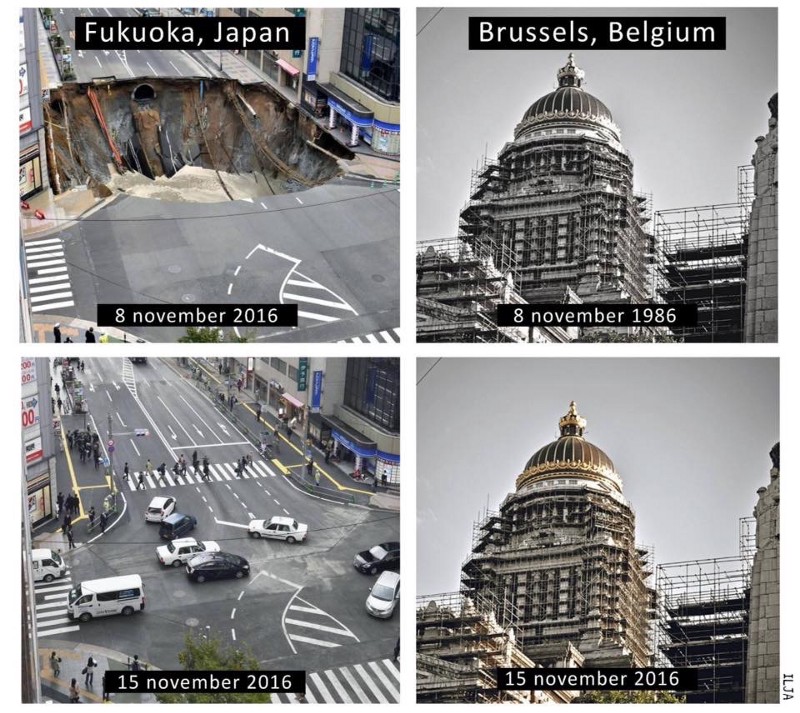
Love: the people.
Our 163 different nationalities in the capital of Europe are well traveled, speak many languages, and don’t take themselves too seriously. They stay connected with fast trains to London, Amsterdam and Paris. There is so much diversity, and so much potential.
So the question is:
How can we unlock our potential?
A bunch of friends met to talk about this. What can we do about things that are broken? Should we first tackle mobility, or education or inclusiveness? How?
There were already numerous initiatives to improve Brussels, but they weren’t connected. Each initiative was operating in a silo, without much collaboration, reinventing the wheel and wasting energy. None had achieved critical mass. Why?
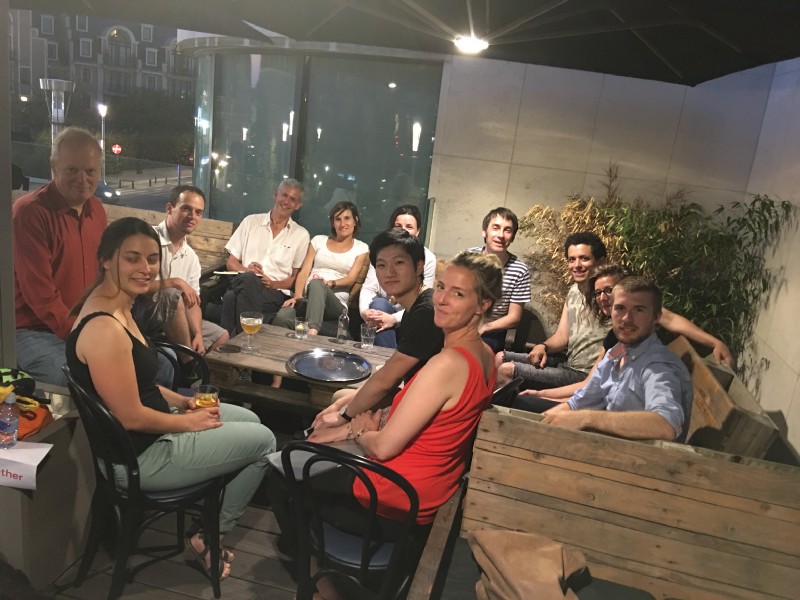
We decided not to create yet another initiative, but instead change the underlying framework. How could we federate? Imagine if instead of all racing each other, we could be a relay team. We would go so much further!
Genesis of #BrusselsTogether
We started with a monthly meetup on the first Wednesday of the month. We give the floor to 3 great initiatives and get to know them. It’s so refreshing and inspiring to see that there are already plenty of citizens doing amazing things in your city. The feedback has been phenomenal.
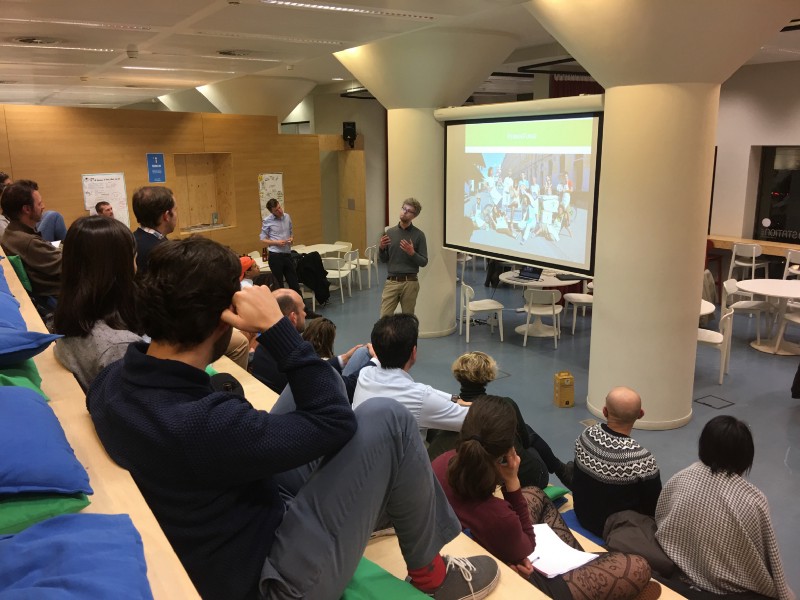
We identify common problems different initiatives struggle with. There are 3 that kept appearing:
- Visibility
- Volunteers
- Funding
Tools and support for any of the above means more time and energy spent on the core mission, and a larger impact in the community. Helping initiatives directly learn from each other enables exponential improvements.
How? We’re doing it already, in a different city called the Internet.
The City Called the Internet
A city is public infrastructure on top of which citizens can build and contribute. The Internet is the same. Without the content citizens create, it has no value.
In the 90s, if you wanted to contribute content as a citizen of the Internet you needed technical skills. Each website needed a web server, and operated in a silo. There was a lot of reinventing the wheel.
The same is happening with citizen initiatives. As soon as they need to collect money and pay expenses, they need their own “server”: a legal entity. That’s a lot of overhead.
We have improved how websites are made by using servers that host multiple sites. Access to shared infrastructure reduces friction and lets more people make websites than before. One technical person can maintain many websites, lowering costs for everyone. And since anyone can “View Source”, we can learn from each other without asking permission. All this adds up to more energy spent on creating content.
We need to do the same for citizen initiatives. Right now, each one operates in a silo like a 90s website. Usually, only one person has access to the bank account, and other initiatives cannot see inside to learn from what they are doing. Every new event, school, or association starts from scratch.
If we want to unlock the potential of citizens in our cities, we need a framework on top of which they can easily create initiatives and learn from each other.
A New Framework , Transparent by Design
The shared infrastructure we’ve set up is a non-profit (BrusselsTogether ASBL/VZW — equivalent of a 501c3 in the US). It functions as a host organization for local initiatives, like a shared server hosting many websites.
Using Open Collective (which I co-founded), we enable any group of citizens to create a virtual association — a collective — in a few clicks (and in English, whereas creating a old fashion non profit in Brussels requires you to do it in French or Dutch). They can be up and running in no time, collecting money online from supporters, with no need for their own lawyers or accountants. Instead, these “technical” people are shared across all the initiatives hosted on the same “server”.
Everything happens with full transparency, so we can learn from each other. How much did it cost to run this event? How much can I ask a sponsor to contribute for this activity? It’s the equivalent of “View Source”.
Building a Database Together
Besides making it easier for citizen initiatives to get up and running, we also want to help them find volunteers and potential backers. So we’re building a database of people interested in improving the city.
If every event uses their own account on Meetup or EventBrite, there’s no way to reach out to everyone. Maintaining a spreadsheet manually is impractical. If we use a shared platform instead, then every time someone registers the database can grow automatically.
That’s why we developed a new tool for events on Open Collective. From now on, every time a collective organizes an event in Brussels, everyone can benefit from building the common database of like-minded participants. The funds from tickets go straight to their collective, which everyone can transparently see.
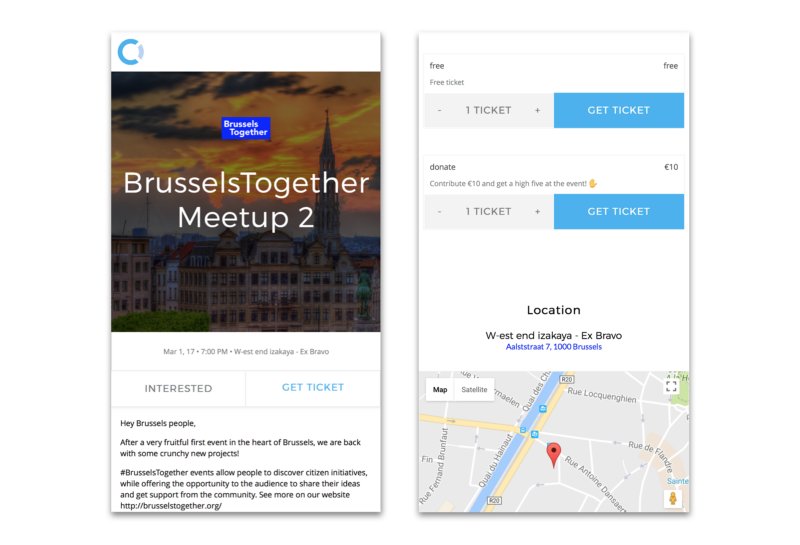
Join us!
If you’re in Brussels, here are some ways to get involved.
- Like our Facebook Page or join our Slack.
- Become a member of BrusselsTogether for €10/month ($10.50) or make a one time donation to our collective.
- Print this poster and display it at your work place or in public.
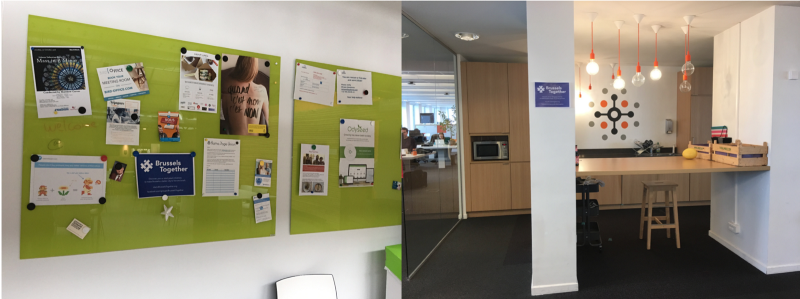
- Manage your events and tickets with a page on BrusselsTogether (you can still use your own branding — contact us (info@brusselstogether.org).
- Instead of creating your own non profit (ASBL/VZW), create a collective on top of BrusselsTogether. It’s easier, and allows us to mutualize more costs for the benefit of all.
- Volunteer to write blog posts about the great initiatives that are happening in Brussels, in English, French, Arabic, Dutch, or another language.
- Come to our monthly meetup the first Wednesday of every month.
- Subscribe to our Podcast (iTunes, SoundCloud).
If you are not in Brussels, get together in your own city and start your own movement. We can learn from each other!

